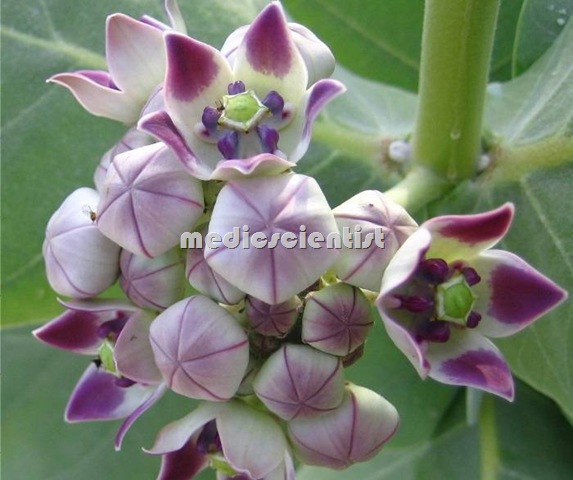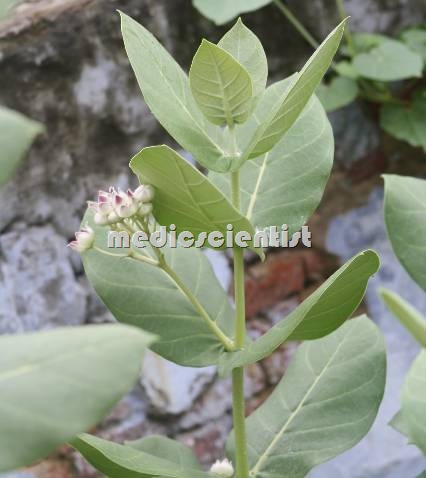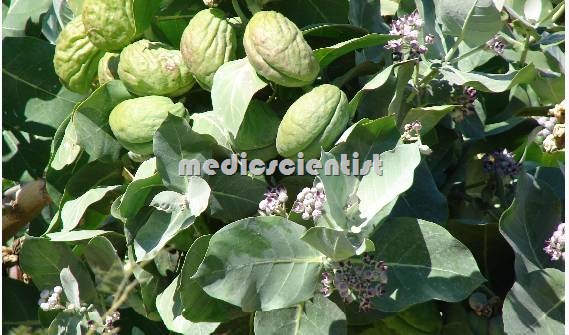ARKA Calotropis procera
Arka consists of dried leaves of Calotropis procera ,(Fam. Asclepiadaceae), Ayurvedic Medicine for piles and Anal Fistula ,found wild more or less throughout India.

Scientific classification
- Kingdom: Plantae
- (unranked): Angiosperms
- (unranked): Eudicots
- (unranked): Asterids
- Order: Gentianales
- Family: Asclepiadaceae
- Genus: Calotropis
- Species: C. procera
- Binomial name — Calotropis procera

SYNONYMS
- Sanskrit : Bhinu, Ravi, Tapana
- English : Madar Tree
- Gujrati : Aakado
- Hindi : Aak, Akavana, Madar
- Assamese : Akan, Akand
- Bengali : Akanda, Akone
- Kashmiri : Acka
- Malayalam : Erikku
- Marathi : Rui
- Oriya : Arakha
- Punjabi : Ak
- Kannada : Ekka, Ekkadagida, Ekkegida
- Tamil : Erukku, Vellerukku
- Telugu : Jilledu
- Urdu : Aak, Madar

DESCRIPTION and PLACES OF ORIGIN of
- Sub-sessile, 6-15 cm by 4.5-8 cm, broadly ovate, ovate-oblong, elliptic or obovate acute, pubescent when young and glabrous on both sides on maturity.
- Lamina – dorsiventral with mesophyll differentiated into a palisade and spongy tissue, closely arranged palisade parenchyma present, spongy parenchyma tissues almost radially elongated with intercellular spaces, central cells irregular in shape,upper and lower epidermis covered externally with a thick, striated cuticle, below upper epidermis three rows of elongated, laticifers and vascular bundles also present scattered in this region
- Midrib – transverse section through midrib shows an upper and lower single layered epidermis externally covered with thick, striated cuticle, few epidermal cells on both surfaces of leaf elongated to form un i-seriate, 2-3 celled trichomes,
- epidermal cells cubical and radially elongated, epidermis followed by 3-8 layered collenchyma on both lower and upper surfaces, stele crescent shaped composed of bicollateral and open vascular bundle, xylem consists mostly of vessels and tracheids, a strip of cambium present between xylem and phloem tissues,parenchymatous cells thin-walled, isodiametric to circular with intercellular spaces present in ground tissue, laticifers also present in the phloem and parenchymatous zone.
Chemical properties
- These belong to the same chemical family as similar chemicals found in foxgloves (Digitalis purpurea).
- The milky sap contains a complex mix of chemicals, some of which are steroidal heart poisons known as “cardiac aglycones”.
- The steroidal component includes an hydroxyl group in the C3β position, a second attached to the C14 carbon, a C/D-cis ring junction and an α,β-unsaturated-γ-lactone in the C17 position.
- These can be a C19-aldehyde in place of the more usual methyl group in this position as well as additional hydroxyl functions and sometimes epoxide structures.
- The features described are those required for toxicity but in addition there can be other substitutions into the steroid nucleus.
- In the plants, the steroidal component is commonly attached via a glycosidic link to a 2-desoxy or a 2,6-didesoxy sugar molecule.
- CONSTITUENTS – Glycoside (Calotropin)
PROPERTIES AND ACTION
- Rasa : Katu, Tikta
- Guna : Laghu, Sara, Snigdha
- Virya : Ushan
- Vipaka : Katu
Function or Karma :
- Vatahar,
- Dipana,
- Krmighna,
- Vra¸ahara,
- Vishaghna,
- vedanahar,
- visahara
IMPORTANT FORMULATIONS –
- Arka Lavana
- Kshar (kshar sutra)
- kshar sutra (pilse)
THERAPEUTIC Medicinal USES
- sotha,
- Kandu,
- Kustha,
- Vrana,
- Krmiroga,
- Gulma,
- Pliharoga,
- Arsa,
DOSE Ayurveda drugs – –
- 250-750 mg of the drug in powder form

